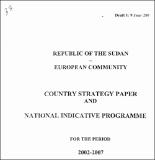| dc.description.abstract | EC formal assistance has remained suspended in the Sudan since 1990, due to EU c aver
about lack of r spect for human rights and democracy, and to the civil conflict. In Nc
1999, the EU and the Sudan engaged in a formal Political Dialogue, aimed at addressi: ho
concerns. In December 2001, the two parties agreed on the need for the continua' ai
intensification of the Dialogue, in the framework of Article 8 of the Cotonou Agreeme /hi
at the same time aiming at a progressive normalisation, conditional to progress on the
discussed withi Z the Dialogue, to be assessed at the end of 2002.
The Sudan, the biggest country in Africa, has been confronted with a civil conflict, which
in the late fiftie >, and which has profoundly divided the country. Its consequences are of cer
dimensions: it .s estimated that two million people have died since 1983; more than e
people have t een displaced; livelihood and cultural identities have been destro
environment is being irreversibly degraded; human rights violations have been massiN
parts of the Suc an have been marginalized. Consequently, large segments of the populat ha
lost their capacity to cope themselves with their livelihoods, while two generations I k
their chance for education.
Due to the recognition by the conflicting parts that the conflict cannot be brought tc t• el
through military means, to increased international focus on the Sudan, it is widely rec 'is,
that opportunities for peace now exist, and could finally be achieved. The Sudan wouk
able to fully develop it's enormous human and natural potential.
The Country St -ategy has been prepared against this background. It is centred on suppo tl
quest for a just peace, as well as addressing root causes of the conflict, while recognir th
democracy, good governance, and the improvement of human rights must be addressed
is to be made st.stainable. Because of the context of the Sudan, the strategy should addrc )as
needs at local 1( vels. The strategy will focus on two main sectors: Food Security, with
the resources o f the National Indicative Programme; and the improvement of educat. tar
training, with 4.)% of the resources. In addition, key cross cutting issues will be given ;) rit
with an allocate d 20% of the resources: Human Rights, Good Governance, and the rule f` la
direct support tc the Peace Process and to peace building initiatives; the strengthening of vii
society and the involvement of Non State Actors; while funds will be made available t'
improvement of the knowledge on key issues related to the strategy.
The strategy will be implemented in North and South Sudan, with agreed modalities
implementation in Non Government controlled areas. The geographical concentration h .ei
based on asses:. ed needs combined with the effects of EC support on the quest foi ac
Because of the extreme complexity and volatility of the situation in the Sudan, the stratc w
be implemented in a flexible and progressive way, with needed adjustments to be made p ;3,1
Particular attention has been given to establish a connection between what has been
recent years with Commission's own funds, and actions to be implemented on the basis t:
present country trategy. | |
